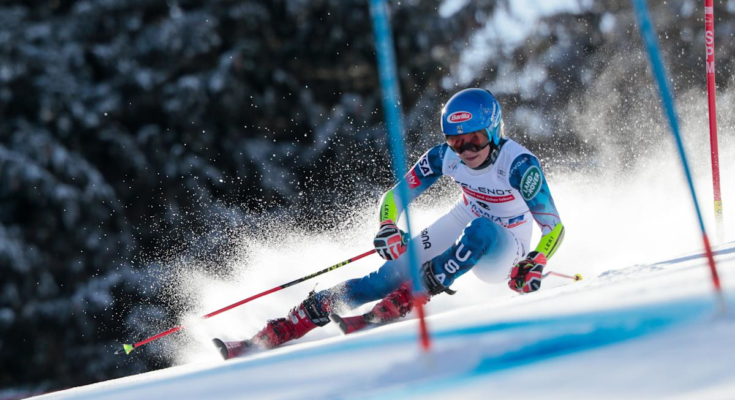YANQING, China — The untamable foe that looms over Mikaela Shiffrin’s Olympic quest ripped across Xiaohaituo Mountain on Saturday, two days before the American Alpine wizard drops into competition.
Shiffrin is, arguably, the greatest female ski racer on the planet. She was a prodigy in 2014, then a multi-time Olympic champ in 2018, and now, even after four years of obstacles and heartache, perhaps the best version of herself. She’s mature and introspective, ready for life as NBC’s face of these Games, and for a medal chase that could vault her further into record books.
She also knows, from experience four years ago and this week, that nature might intervene.
“You could do everything right, and get a gust of wind,” she said here Friday. “And that’s that.”
It was wind, remember, that interrupted this same quest four years ago, unbalancing slalom skiers and compressing Shiffrin’s ambitious schedule. She’d hoped to race in five individual events, but ultimately competed in just three. She arrived in Beijing once again eyeing five, spread out over 11 days, but of course, that could change. Devilish weather could postpone races, as it did a men’s downhill training session Saturday. It could also strike at any time mid-race.
“Hopefully, ideally, nobody is going to face one of the really, really big gusts, where you get totally lost, and you pretty much get nearly blown off the mountain,” Shiffrin said. The possibility is especially perilous in the downhill and super-G, Shiffrin’s non-specialties.
“Skiing speed, when you’re getting air off terrain, and then if you get a big gust when you’re in the air, that becomes not only challenging but very, very dangerous,” she continued.
Then she arrived at a conclusion that she, like other alpine skiers, has learned to accept.
“There’s going to be a huge element of just crossing your fingers during this Games,” she said.
“It is a little bit of a bummer when you go into a very important series of races knowing that there’s some factors that are normally not so extreme in any other races that we do, that could really play a role in how the results pan out,” she added. “That is — it’s easy to kind of get a little bit bummed out by that.”
What the now 26-year-old Shiffrin has learned over the years, and especially recent ones, is to “control what you can control.” And to appreciate that, when luck enters life’s equations, perfection is rarely possible.
She learned this over the most imperfect years of her life. They began with a two-medal haul in 2018 that many branded failure. They continued, more recently, with injuries and a pandemic. But nothing compared to what she felt two years ago this week.
She was high up in the Italian Alps when the phone rang. Her father, Jeff, she was told, had suffered a serious injury back in Colorado at the family home. Shiffrin and her mother scrambled to find a flight. They reached his bedside. Hours later, he died.
The entire Shiffrin family was crushed beyond belief. Mikaela was particularly struck by grief. It weighed her down for months, and kept her away from ski slopes. Tears erupted regularly. Fog enveloped her being. When she did return to the sport, her mastery of it had seeped away. At the top of hills, she’d black out. Downhill races, her coaches and staff decided, weren’t even safe.
Gradually, though not linearly or fully, she recovered. She learned to cope with the grief, and overcame a vexing back injury, and returned to something reasonably close to her best this past season. In her final slalom race before the Olympics, a couple weeks after clearing a COVID infection, she came from behind to beat her chief rival, Petra Vlhova, and broke the record for most World Cup wins in a single alpine skiing discipline.
“Dad,” she wrote on Instagram afterward. “I hope you had a good view.”
She still thinks about him, of course. A few days after arriving in Beijing, the two-year anniversary of his death arrived. “It’s hard not to remember the place we were in,” Shiffrin said. She’d had some “difficult, challenging moments” as she awaits Monday’s giant slalom, her first 2022 Olympic race.
“But, I mean, I like being here,” she said.
“To be honest, I actually do feel good.”
She is, it seems, in some ways, in a better place than she was four years ago, with more reasonable expectations on the outside and within. She isn’t worried about finishing second. She isn’t worried about what the media will think if she does. She’s thinking and speaking enthusiastically about the dry, “grippy,” “aggressive” Colorado-esque snow. She wants to take on all five individual races here, and although the downhill is “the biggest event in question,” she said, “there’s not a lot of reason I see why I wouldn’t do the downhill, unless there’s schedule changes and fatigue starts playing a role.”
But she’s prepared for best-laid plans to fizzle. “It’s an impossibility to have a perfect two weeks of Games,” she said. “This Olympics or any Olympics — I don’t think it’s possible to walk away without some level of disappointment about something.”
And especially in this sport. Especially after, on her first day of skiing here, she and her team tried to get on a legitimate training hill, only to be told the top of the mountain was closed due to wind.
“So, we were like, OK, we’re going to the bunny slope,” she said.
“There’s some things with Alpine that you really just can’t work around.”


